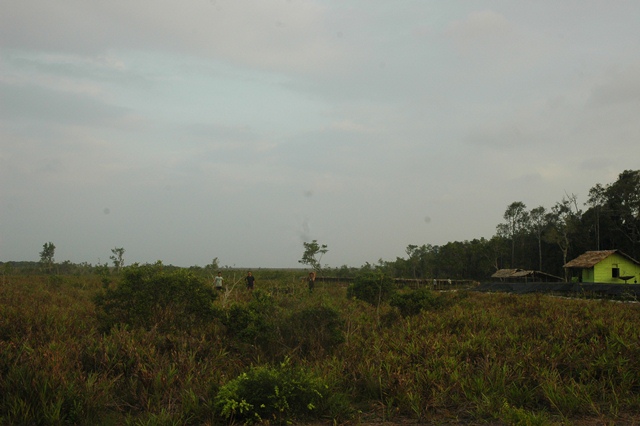 We stand looking out over a desolate landscape of white sand and low, stunted shrubs. Nothing moves except for the small bushes which are stirred by a hot wind that sweeps and moans across this desert. You half expect a lion or a giraffe to walk into view, or for the Lone Ranger to ride up on a thirsty and exhausted horse.
We stand looking out over a desolate landscape of white sand and low, stunted shrubs. Nothing moves except for the small bushes which are stirred by a hot wind that sweeps and moans across this desert. You half expect a lion or a giraffe to walk into view, or for the Lone Ranger to ride up on a thirsty and exhausted horse.
But this is not the desert savannah of Africa or the plains of the western US. It’s Lamandau River Wildlife Reserve, Central Kalimantan on the island of Borneo, more associated with lush tropical rain forest, than arid desert scrub.
And of course this was once a green tropical paradise, vibrant with plant-life, animals, insects and birds.
Until, that is, the loggers came, to clear-cut the forest for the timber that we crave, and apparently can’t do without. That was many years ago, and since then this huge area has lain dormant, and unused. An ugly scar on the face of the earth.
Under Indonesian law, the loggers are required to replant the trees that they have cut, but this is easily circumvented, often by closing the original company, and starting anew somewhere else in the forests.
Based on the success of FNPF (Friends of the National Parks Foundation) reforestation projects in other parts of Central Kalimantan, Bayu and his team have been invited by the local government to open a centre here in Lamandau, to start the process of re-greening the desert.
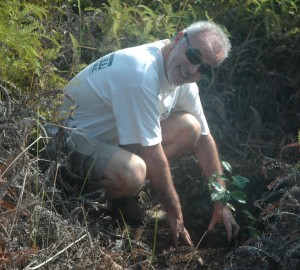 We were on a 4-day visit to see the progress of FNPF’s efforts to replant trees here in Central Kalimantan, in areas near Tanjung Puting National Park. The team includes FNPF Director and Founder Bayu Wirayudha; Michael Kennedy, Director and Co-Founder of HSI Australia (Humane Society International Australia), a key FNPF donor, and Lily Wardoyo, an FNPF Ubud volunteer.
We were on a 4-day visit to see the progress of FNPF’s efforts to replant trees here in Central Kalimantan, in areas near Tanjung Puting National Park. The team includes FNPF Director and Founder Bayu Wirayudha; Michael Kennedy, Director and Co-Founder of HSI Australia (Humane Society International Australia), a key FNPF donor, and Lily Wardoyo, an FNPF Ubud volunteer.
FNPF has several replanting sites near the Tanjung Putting National Park. The oldest of these is at Pesalat, where FNPF has been busy planting tree saplings for the past 7 years. The results are heart-warming, and spectacular.
On our recent visit a flock of black hornbills crossed the young forest, and other bird species flitted from tree to tree. The Pesalat forest is also home to deer and pigs, and other animals, and most exciting of all, orangutan, who come here to feed on fruit from the replanted trees. Bayu showed us the remains of fruit eaten by orangutan, and explained that they feel safe to enter the replanting zone, even though they must spend some time on the ground as they traverse the forest.
As with other FNPF sites in Kalimantan, there is an office with accommodation for workers and volunteers. The one at Pesalat is particularly pleasant, surrounded by shady trees, and a nursery for saplings of many different tree species.
FNPF has other replanting sites at Beguruh, where you can climb a fire-watching tower to view the developing replanted forest below, and Padang Sembilan, a newer site in an area of former farming and rice-growing fields, where the tiny saplings must compete with ferns and other vegetation that makes this a particularly challenging replanting task.
At Jerumbun, FNPF is encouraging staff and local villagers to experiment with agro-forestry crops, such as rubber, gaharu and watermelons. This area buffers the river from a large palm-oil plantation, and the day before our visit, a fire had seen FNPF staff rushing to assess any damage, and to be ready to fight the flames, if necessary.
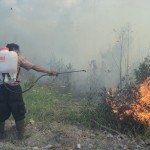
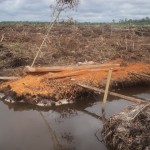
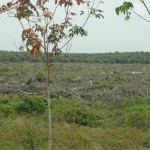 Fores t fires, some set deliberately, particular ly near p alm-oil plantations, are a constant source of worry for FNPF. Several developi ng forest areas have been damaged by fires, and it is heartbreaking for FNPF workers to see trees that they have nurtured for years, destroyed in the blink of an eye.
Fores t fires, some set deliberately, particular ly near p alm-oil plantations, are a constant source of worry for FNPF. Several developi ng forest areas have been damaged by fires, and it is heartbreaking for FNPF workers to see trees that they have nurtured for years, destroyed in the blink of an eye.
A young orangutan was spotted at Jerumbun during our visit, but he quickly fled into the nearby forest. The potential conflict between man and orangutan was illustrated graphically by the sight of young rubber trees, planted as cash-crops by villagers, where the bark had been chewed off by the animals.
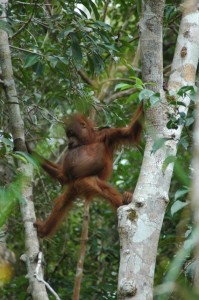 All of the replanting work carried out by FNPF has resulted in a substantial body of knowledge about how best to carry out this important work, and the spirit of experimentation has infused the work of Bayu and his team.
All of the replanting work carried out by FNPF has resulted in a substantial body of knowledge about how best to carry out this important work, and the spirit of experimentation has infused the work of Bayu and his team.
They now know the best tree species for different soil, climate and vegetation conditions; the optimal interval to leave between saplings and other vegetation; the best season to plant, and so on.
As with any land-use issue, though, there are abundant potential conflicts with the various stakeholders, and in Central Kalimantan they include the local communities, palm-oil companies, logging both legal and illegal, gold miners, the local government, and even other NGO’s. It is vital that these various stakeholders support, or at least do not hinder, the work of FNPF.
At the nearby village of Tanjung Harapan we visited a small house that will be used as a library for the village children to learn about their environment, and the importance of preserving the local forests.
FNPF is also supporting village ecotourism and agroforestry initiatives in Tanjung Harapan, encouraging the development of livelihoods that do not depend, like logging and gold-mining, on the unsustainable exploitation of local resources.
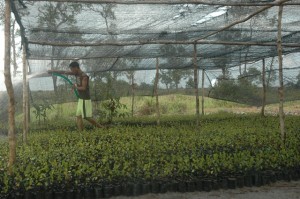
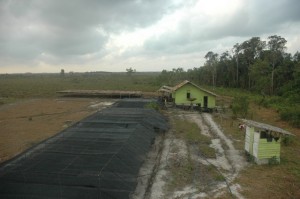 Back at Lamandau, the task is particularly challenging. Not only is the destroyed area a large one, but the soil, and climatic conditions are unfavourable. The soil in many places is simply white sand.
Back at Lamandau, the task is particularly challenging. Not only is the destroyed area a large one, but the soil, and climatic conditions are unfavourable. The soil in many places is simply white sand.
FNPF have made a great start, however. The office and centre nestles in the lee of a sliver of surviving forest, which holds an all-important water supply, rare in this area. Replanting has already started, and tiny saplings reach for the sky around the FNPF center. Experimentation by the FNPF team has shown that saplings grafted from larger trees grow quicker, and are stronger once planted, and this promises to speed up the planting process.
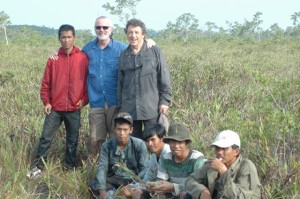 It is hard, now, to see this blighted land being transformed into a sea of green. But with the willpower and experience of Bayu and his FNPF team, and the support of generous and far-sighted donors, such as Humane Society International, The Boeing Corporation and Taronga Zoo, the vision will become reality.
It is hard, now, to see this blighted land being transformed into a sea of green. But with the willpower and experience of Bayu and his FNPF team, and the support of generous and far-sighted donors, such as Humane Society International, The Boeing Corporation and Taronga Zoo, the vision will become reality.
As Michael Kennedy of HSI said after his recent visit, “The forest rehabilitation work of FNPF is truly inspirational. Their commitment to protecting Tanjung Puting National Park is second to none, and we are very proud to be associated with their on-going conservation achievements.”
Eden Recreated
Restoring Kalimantan’s Degraded Forests
By Farquhar Stirling
We stand looking out over a desolate landscape of white sand and low, stunted shrubs. Nothing moves except for the small bushes which are stirred by a hot wind that sweeps and moans across this desert. You half expect a lion or a giraffe to walk into view, or for the Lone Ranger to ride up on a thirsty and exhausted horse.
But this is not the desert savannah of Africa or the plains of the western US. It’s Lamandau River Wildlife Reserve, Central Kalimantan on the island of Borneo, more associated with lush tropical rain forest, than arid desert scrub.
And of course this was once a green tropical paradise, vibrant with plant-life, animals, insects and birds.
Until, that is, the loggers came, to clear-cut the forest for the timber that we crave, and apparently can’t do without. That was many years ago, and since then this huge area has lain dormant, and unused. An ugly scar on the face of the earth.
Under Indonesian law, the loggers are required to replant the trees that they have cut, but this is easily circumvented, often by closing the original company, and starting anew somewhere else in the forests.
Based on the success of FNPF (Friends of the National Parks Foundation) reforestation projects in other parts of Central Kalimantan, Bayu and his team have been invited by the local government to open a centre here in Lamandau, to start the process of re-greening the desert.
We were on a 4-day visit to see the progress of FNPF’s efforts to replant trees here in Central Kalimantan, in areas near Tanjung Puting National Park. The team includes FNPF Director and Founder Bayu Wirayudha; Michael Kennedy, Director and Co-Founder of HSI Australia (Humane Society International Australia), a key FNPF donor, and Lily Wardoyo, an FNPF Ubud volunteer.
FNPF has several replanting sites near the Tanjung Putting National Park. The oldest of these is at Pesalat, where FNPF has been busy planting tree saplings for the past 7 years. The results are heart-warming, and spectacular.
On our recent visit a flock of black hornbills crossed the young forest, and other bird species flitted from tree to tree. The Pesalat forest is also home to deer and pigs, and other animals, and most exciting of all, orangutan, who come here to feed on fruit from the replanted trees. Bayu showed us the remains of fruit eaten by orangutan, and explained that they feel safe to enter the replanting zone, even though they must spend some time on the ground as they traverse the forest.
As with other FNPF sites in Kalimantan, there is an office with accommodation for workers and volunteers. The one at Pesalat is particularly pleasant, surrounded by shady trees, and a nursery for saplings of many different tree species.
FNPF has other replanting sites at Beguruh, where you can climb a fire-watching tower to view the developing replanted forest below, and Padang Sembilan, a newer site in an area of former farming and rice-growing fields, where the tiny saplings must compete with ferns and other vegetation that makes this a particularly challenging replanting task.
At Jerumbun, FNPF is encouraging staff and local villagers to experiment with agro-forestry crops, such as rubber, gaharu and watermelons. This area buffers the river from a large palm-oil plantation, and the day before our visit, a fire had seen FNPF staff rushing to assess any damage, and to be ready to fight the flames, if necessary.
Forest fires, some set deliberately, particularly near palm-oil plantations, are a constant source of worry for FNPF. Several developing forest areas have been damaged by fires, and it is heartbreaking for FNPF workers to see trees that they have nurtured for years, destroyed in the blink of an eye.
A young orangutan was spotted at Jerumbun during our visit, but he quickly fled into the nearby forest. The potential conflict between man and orangutan was illustrated graphically by the sight of young rubber trees, planted as cash-crops by villagers, where the bark had been chewed off by the animals.
All of the replanting work carried out by FNPF has resulted in a substantial body of knowledge about how best to carry out this important work, and the spirit of experimentation has infused the work of Bayu and his team.
They now know the best tree species for different soil, climate and vegetation conditions; the optimal interval to leave between saplings and other vegetation; the best season to plant, and so on.
As with any land-use issue, though, there are abundant potential conflicts with the various stakeholders, and in Central Kalimantan they include the local communities, palm-oil companies, logging both legal and illegal, gold miners, the local government, and even other NGO’s. It is vital that these various stakeholders support, or at least do not hinder, the work of FNPF.
At the nearby village of Tanjung Harapan we visited a small house that will be used as a library for the village children to learn about their environment, and the importance of preserving the local forests.
FNPF is also supporting village ecotourism and agroforestry initiatives in Tanjung Harapan, encouraging the development of livelihoods that do not depend, like logging and gold-mining, on the unsustainable exploitation of local resources.
Back at Lamandau, the task is particularly challenging. Not only is the destroyed area a large one, but the soil, and climatic conditions are unfavourable. The soil in many places is simply white sand.
FNPF have made a great start, however. The office and centre nestles in the lee of a sliver of surviving forest, which holds an all-important water supply, rare in this area. Replanting has already started, and tiny saplings reach for the sky around the FNPF center. Experimentation by the FNPF team has shown that saplings grafted from larger trees grow quicker, and are stronger once planted, and this promises to speed up the planting process.
It is hard, now, to see this blighted land being transformed into a sea of green. But with the willpower and experience of Bayu and his FNPF team, and the support of generous and far-sighted donors, such as Humane Society International, The Boeing Corporation and Taronga Zoo, the vision will become reality.
As Michael Kennedy of HSI said after his recent visit, “The forest rehabilitation work of FNPF is truly inspirational. Their commitment to protecting Tanjung Puting National Park is second to none, and we are very proud to be associated with their on-going conservation achievements.”







